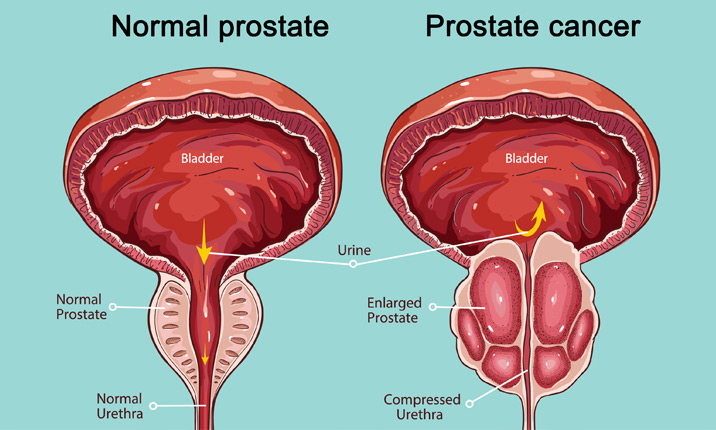
Prostate enlargement: Overview
Prostate gland enlargement — is a common condition as men get older. An enlarged prostate gland can cause uncomfortable urinary symptoms, such as blocking the flow of urine out of the bladder. It can also cause bladder, urinary tract or kidney problems.
There are several effective treatments for prostate gland enlargement, including medications, minimally invasive therapies and surgery. To choose the best option, you and your doctor will consider your symptoms, the size of your prostate, other health conditions you might have and your preferences.
Symptoms
The severity of symptoms in people who have prostate gland enlargement varies, but symptoms tend to gradually worsen over time. Common signs and symptoms of BPH include:
• Frequent or urgent need to urinate
• Increased frequency of urination at night (nocturia) • Difficulty starting urination
• Weak urine stream or a stream that stops and starts • Dribbling at the end of urination
• Inability to completely empty the bladder Less common signs and symptoms include: • Urinary tract infection
• Inability to urinate
• Blood in the urine
The size of your prostate doesn’t necessarily determine the severity of your symptoms. Some men with only
slightly enlarged prostates can have significant symptoms, while other men with very enlarged prostates can have only minor urinary symptoms.
In some men, symptoms eventually stabilize and might even improve over time.
Other possible causes of urinary
symptoms
Conditions that can lead to symptoms similar to those caused by enlarged prostate include:
• Urinary tract infection
• Inflammation of the prostate (prostatitis)
• Narrowing of the urethra (urethral stricture)
• Scarring in the bladder neck as a result of previous surgery • Bladder or kidney stones
• Problems with nerves that control the bladder
• Cancer of the prostate or bladder
When to see a doctor
If you’re having urinary problems, discuss them with your doctor. Even if you don’t find urinary symptoms bothersome, it’s important to identify or rule out any underlying causes. Untreated, urinary problems might lead to obstruction of the urinary tract.
If you’re unable to pass any urine, seek immediate medical attention.
Causes
The prostate gland is located beneath your bladder. The tube that transports urine from the bladder out of your penis (urethra) passes through the center of the prostate. When the prostate enlarges, it begins to block urine flow.
Most men have continued prostate growth throughout life. In many men, this continued growth enlarges the prostate enough to cause urinary symptoms or to significantly block urine flow.
It isn’t entirely clear what causes the prostate to enlarge. However, it might be due to changes in the balance of sex hormones as men grow older.
Risk factors
Risk factors for prostate gland enlargement include:
• Aging. Prostate gland enlargement rarely causes signs and
symptoms in men younger than age 40. About one- third of men experience moderate to severe symptoms by age 60, and about half do so by age 80.
• Family history. Having a blood relative, such as a father or a brother, with prostate problems means you’re more likely to have problems.
• Lifestyle. Obesity increases the risk of BPH, while exercise can lower your risk.
Complications
Complications of an enlarged prostate can include:
• Sudden inability to urinate (urinary retention). You
might need to have a tube (catheter) inserted into your bladder to drain the urine. Some men with an enlarged prostate need surgery to relieve urinary retention.
• Urinary tract infections (UTIs). Inability to fully empty the bladder can increase the risk of infection in your urinary tract. If UTIs occur frequently, you might need surgery to remove part of the prostate.
• Bladder stones. These are generally caused by an inability to completely empty the bladder. Bladder stones can cause infection, bladder irritation, blood in the urine and obstruction of urine flow.
• Bladder damage. A bladder that hasn’t emptied completely can stretch and weaken over time. As a result, the muscular wall of the bladder no longer contracts properly, making it harder to fully empty your bladder.
• Kidney damage. Pressure in the bladder from urinary retention can directly damage the kidneys or allow
bladder infections to reach the kidneys.
Most men with an enlarged prostate don’t develop these complications. However, acute urinary retention and kidney damage can be serious health threats.
Having an enlarged prostate is not believed to increase your risk of developing prostate cancer.
Address: Sallaghari Ukalo -1, Bhaktapur
Tel: 01-6612695, 01-6612705, 01-6620371, 01-6620816, 9861937345 ,9860025333 (Ambulance)
Email: info@iwamurahospital.com